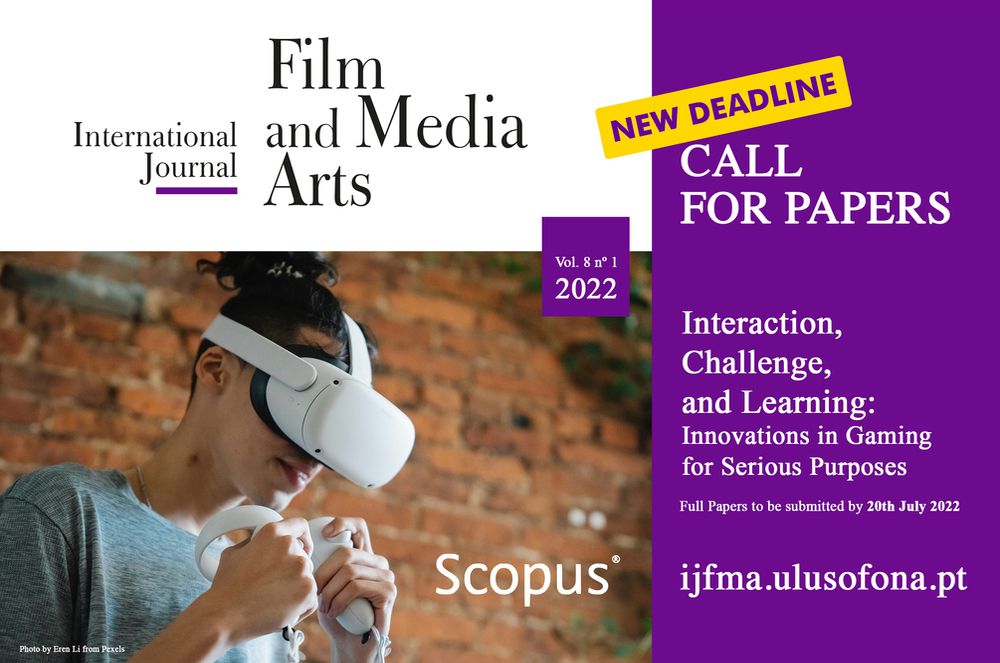NEW DEALINE for Submissions! Call for Papers IJFMA Vol. 8 No.1

IJFMA Vol. 8 No.1 (2023)
Interaction, Challenge, and Learning: Innovations in Gaming for Serious Purposes
Guest Editors:
Pedro Pinto Neves - Lusófona University, HEI-Lab
Carla Sousa - Lusófona University, CICANT
Micaela Fonseca - Lusófona University, HEI-Lab
Sara Hasani Darabadi - London South Bank University
Game-based learning has made tremendous progress in the past thirty years. Games and learning were once limited to more or less isolated experiments, with scholarship struggling to move past simply acknowledging and coming to grips with the undeniable potential of games for learning. Games struggled to understand learning, and learning struggled to understand games. Since then, entire programs for learning with games have been implemented across a significant cross-section of disciplines and learning contexts, robust studies of real applications of games in learning have been carried out, alongside the building of a robust body of method for designing games and pedagogy together. Games have become a realistic option for training in solving wicked problems, with non-obvious solutions, wherever creative, systems-oriented thinking is required.
Currently, however, the use of games in learning and for serious purposes in general is still less ubiquitous than their vast potential would suggest. Games are now regularly used in learning owing to the work of researchers, educators, and game designers, but there is more to be done before they deliver on their full benefits.
The field of Games-based Learning, or GBL, suffered from what Jaakko Stenros and Annika Waern classified as the Digital Fallacy – the tendency to regard analog games as a subset of digital games rather than the other way around. The development of games for learning may have been stymied somewhat by an excessive focus on digital games. Where boardgames were once associated with the past of games and learning and digital games with the future, there are now fresh insights and applications for boardgames in learning – alongside with their renaissance as games for entertainment. Digital games and boardgames for education are now joined by a broader, more inventive sense of playable media for education, including other analog forms such as locative and social space games, mixed-media forms such as Expanded Reality, and new frontiers in adaptive in intelligent systems.
This special issue of the International Journal of Film and Media Arts invites game design researchers, researchers in games studies, designer-educators, pedagogists, and artists that have played with learning to submit papers that deal with but are not limited to the topics of:
- Inclusion, co-creation and participative games
- Game Design-based Learning
- Game design models for Game-Based Learning
- Integration of games in formal and informal educational contexts
- Learning styles, behaviours and personalities in educational games
- Adaptive games design for Game-Based Learning
- Artificial Intelligence, Machine Learning, and Game-based Learning
- Accessibility of Game-Based approaches
- Games, Engagement and Flow
Keywords: Games; Learning; Game-Based Learning; Education; Serious Gaming.
Abstracts to be submitted by 20th July 2022.
Provide two Word documents (.doc) with:
1. ABSTRACT, no longer than 500 words with 5 keywords.
The abstract should not have any reference to the authors or the institution they belong to. The authors must ensure that their manuscripts are prepared in such a way that they do not reveal their identities to reviewers, either directly or indirectly.
1. BIO, no longer than 200 words. Name, Email address and institutional affiliation. Authors should indicate the call for papers they are submitting.
Please submit to:
Authors should indicate the call for papers they are submitting.
Timeline for publication:
Abstract Submission: 20th July 2022
1st round feedback from reviewers: 29th July 2022
Full Paper Submission: 15th October 2022
2nd round feedback from reviewers: 9th January 2023
Final Revisions: 8th January 2023
Online Publication: 12th February 2023
Submission online or via email will be made anonymously. Submissions will be reviewed by at least 2 peer reviewers. Accepted abstracts will be given guidelines for the preparation and submission of the final text for the 2nd round of double blind peer-reviews.
No fees are requested for submission or processing.
- published 05 July 2022
- modified 20 September 2022
